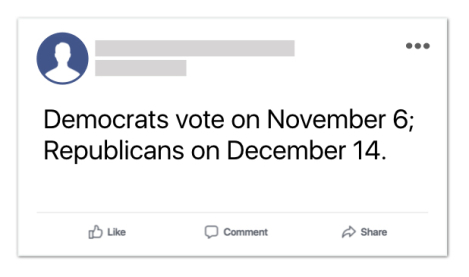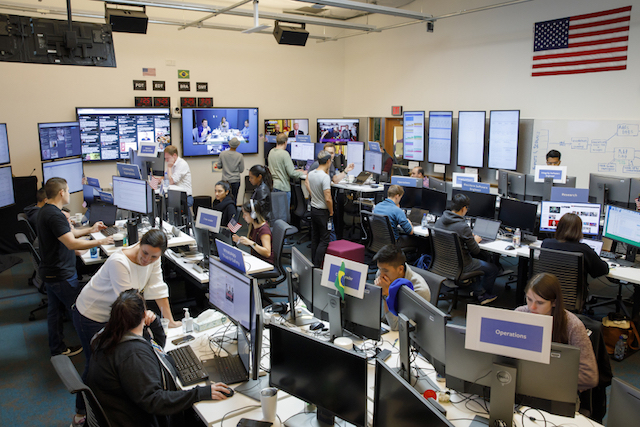Can Facebook block lies about voting?
In the US, the midterm election day is one week from today, November 6. Facebook says it will ban misinformation on voting. If you find this news item encouraging, allow me to discourage you.
First off, the ban is limited in scope. Facebook is not banning fake news (as if such a thing were possible) — the social network has explicitly said that if you want to lie on Facebook, that’s fine with them. So if I want to tell you that George Soros is in league with extraterrestrial aliens to use mind control on people who go to church, Facebook won’t stop me. If I tell you that Donald Trump is sending the army to the border of Mexico to stop an invasion of Hondurans, they can’t stop me from that, either. (Wait, that one is true.)
The ban applies only to information about voting. So if I tell you that voting for Democrats will make your hair fall out, that’s fine, but if I tell you that election day in North Dakota is actually on November 7, that’s an attempt to spread voting misinformation, which is against the rules. This matters, because voting misinformation could deter people from voting. If I tell you that the voting location in your precinct has changed when it hasn’t, or that there are long lines at the polls when there aren’t, I could keep you from showing up at the polls.
Even looking only at this narrow category of lies, can Facebook actually stop this sort of misinformation from spreading?
The media has already gotten overoptimistic. Here’s what CNBC published, in an article syndicated from Reuters:
Facebook will ban misinformation around voting during the midterm elections
- Facebook will ban false information about voting requirements and fake reports of violence or long lines at polling stations.
- Facebook instituted a global ban on false information about when and where to vote in 2016, but Monday’s move goes further.
Facebook will ban false information about voting requirements and fake reports of violence or long lines at polling stations in the run-up to and during next month’s U.S. midterm elections, company executives told Reuters, the latest effort to reduce voter manipulation on its service.
The world’s largest online social network, with 1.5 billion daily users, has stopped short of banning all false or misleading posts, something that Facebook has shied away from as it would likely increase its expenses and leave it open to charges of censorship.
Regrettably, this is not accurate. In particular, the part about “banning” misinformation is too broad. Reuters corrected its own article to indicate that the actual action would be fact-checking, not banning. Here’s what the corrected Reuters article says (I’ve added bold italic to show what changed).
Exclusive: Facebook to ban misinformation on voting in upcoming U.S. elections
MENLO PARK, Calif. (Reuters) – Facebook Inc will ban false information about voting requirements and fact-check fake reports of violence or long lines at polling stations ahead of next month’s U.S. midterm elections, company executives told Reuters, the latest effort to reduce voter manipulation on its service. . . .
Links to discouraging reports about polling places that may be inflated or misleading will be referred to fact-checkers under the new policy, Facebook said. If then marked as false, the reports will not be removed but will be seen by fewer of the poster’s friends. . . .
(This version of the story was corrected to say that polling-place misinformation will be fact-checked, not that it will be banned outright in paragraph one; in 8th graph adds explanation of how reports on polling places will be handled)
That’s hardly a “ban on misinformation.” And when you go back to the actual post on Facebook’s news page, you see it’s even weaker than that.
Expanding Our Policies on Voter Suppression
By Jessica Leinwand, Public Policy Manager
As part of our ongoing efforts to prevent people from misusing Facebook during elections, we’re broadening our policies against voter suppression — action that is designed to deter or prevent people from voting. These updates were designed to address new types of abuse that we’re seeing online.
We already prohibit offers to buy or sell votes as well as misrepresentations about the dates, locations, times and qualifications for casting a ballot. We have been removing this type of content since 2016. Here is an example:

Last month, we extended this policy further and are expressly banning misrepresentations about how to vote, such as claims that you can vote using an online app, and statements about whether a vote will be counted (e.g. “If you voted in the primary, your vote in the general election won’t count.”). We’ve also recently introduced a new reporting option on Facebook so that people can let us know if they see voting information that may be incorrect, and have set up dedicated reporting channels for state election authorities so that they can do the same.
We recognize that some posts that are reported to us may require additional review. For example, we’re unable to verify every claim about the conditions of polling places around the world (e.g. “Elementary School Flooded, Polling Location Closed”). In these cases, we will send content to our third-party fact-checkers for review. Content that is rated false will be ranked lower in News Feed, and accompanied by additional information written by our fact-checkers (what we call, Related Articles) on the same subject.
So, here’s what we’ve learned.
Facebook will ban obviously fake information that’s national (like wrong voting dates).
But their ability to ban such information depends on whether it gets referred to the people in Facebook’s “war room” of election-day checkers. Here’s a picture of that war room.

Now imagine, for a moment, the similar room in Russia where a bunch of trolls are coming up with fake voter information to spread right around election day. Do you think the Russians will be able to overwhelm this room of people at Facebook? Do you imagine that the Russians, unencumbered by any actual need for truth, and capable of coming up with hundreds of variations on every hoax, will be able to get around this room of fact-checkers who must carefully examine each post to see if it is, indeed, untrue? I think the Russians have the edge in this one.
And that’s just national news and viral hoaxes.
What happens if I tell you that a voting location in Houston is filled with toxic mold spores from the Hurricane Harvey flooding and post a fake mold photo?

Would you still go the polling place? That looks nasty!
There is no way for Facebook to police this kind of local fakery; verifying these local events is pretty much impossible. Already, there are conflicting accounts about problems with voting machines in Texas. Untangling the truth about local voting is not something an algorithm can do, and Facebook has already preemptively stated that it’s giving up on such posts, referring them to third-party fact checkers. (Do you think Snopes and Politifact are going to verify every local post about problems in voting locations?)
Facebook’s plan to stop voting misinformation has enough holes to fill the Albert Hall. It will stop the most obvious misinformation, but it’s completely inadequate to fix the problem.
Vote early if you can. Vote on November 6 if you can. But don’t count on Facebook to prevent fake news about voting from spreading. Be skeptical. And if your Facebook friends are spreading false information about voting locations or conditions, check it, don’t spread it.
There are a lot of trolls intent on suppressing voting in November. Please don’t become their accomplice.
Good heavens, today is November 6?!? Even my calendar is fake news!